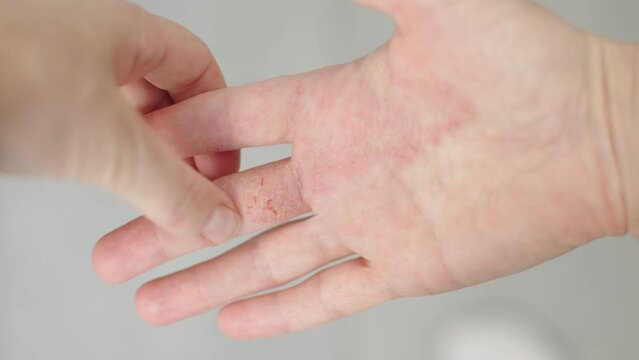Dermatitis on a nervous basis develops in the form of spots on the neck, head, hands, flexural areas, groin, buttock folds. Over time, the skin in these areas becomes thicker and more damaged. Even strong treatment with hormonal agents provides temporary relief but does not resolve the problem. For this type of dermatitis, it is recommended to use creams (for example, Aristocort Cream, Desowen Cream) for wound healing. Regular application of the cream on the affected skin areas helps reduce itching and the development of complications. A doctor can recommend the appropriate cream for your needs after conducting a thorough examination. Using the right products for caring for damaged skin helps alleviate symptoms more quickly.
This type of disease is also a chronic dermatosis and it falls under the general group, which is known as “atopic dermatitis”. Doctors may use both specific and general terms to describe it. In the initial stages, the symptoms may resemble seborrheic or contact dermatitis, requiring differential diagnosis.
Neurodermatitis occurs in both, children and adults. First symptoms typically appear between 6 months and 7 years old. After reaching puberty, the condition often goes into persistent remission. Up to 80% of children will no longer experience its manifestations, though their skin remains sensitive and prone to allergic reactions. Treating children is challenging because it’s difficult to explain to them not to scratch their skin. Additionally, glucocorticosteroid therapy is prohibited in childhood.
The exact cause of the disease is still under research. Doctors believe that neurodermatitis is a specific condition of the nervous system, where nerve endings transmit false information to the brain about stimuli that are not present. For example, neurodermatitis may possibly develop after nerve damage, which is difficult to diagnose. Therefore, it is not always possible to determine the exact cause that triggered the exacerbation. Clinical presentation and patient history play a crucial role in diagnosing dermatitis. In some cases, allergy tests directly on the skin (patch tests, scratch tests) and blood samples from the patient are used.
Research identifies several triggers that provoke neurodermatitis:
- stress, overstrain, nervous exhaustion;
- aggressive detergents and cosmetics;
- rough-textured fabrics such as linen and wool;
- contact with allergens (animal skin flakes and fur, mold, dust, certain products);
- dry outside air, low indoor humidity;
- severe infections;
- poor personal hygiene practices;
- susceptibility to sweating;
- pregnancy.
There are many factors influencing the manifestation of intense itching in neuro-atopic dermatitis. Often, a range of reasons occurs when individuals prone to allergies encounter allergens and stress simultaneously. While some patients manage to identify implicit causes, in others, these causes remain unidentified. It is also believed that if parents suffered from such an ailment, there is an 80% chance it will be inherited. Therefore, it is crucial to always monitor your health and promptly consult a doctor when needed.

